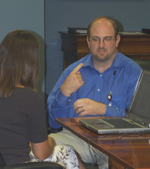Cochlear implant recipient gets
‘hooked up’
by
Heather WoolwinePublic Relations
For the first time in South Carolina, an MUSC patient and staff member received his second cochlear implant to accompany the one he received more than 10 years ago.
Cracking a window for the future of bilateral cochlear implantation in the United States, Jack King, Ph.D., Otolaryngology assistant professor in the MUSC College of Medicine and director of the Vestibular and Balance Program, described himself as very excited as he waited to become “hooked up” July 20.
 Abby Connell,
audiologist, connects Dr. Jack King's new cochlear implant to her
computer so he can undergo his first programming session.
Abby Connell,
audiologist, connects Dr. Jack King's new cochlear implant to her
computer so he can undergo his first programming session. “Although having my first implant was very helpful, it worked best when it was relatively quiet, and speech perception would break down when I entered nosier situations,” he said. “I’m really looking forward to seeing improvement through the newer device.”
A decade has passed since King’s last implantation, and simply put, the science and technology greatly improved. With smaller, smarter devices, implantation is becoming not only a more popular option for those with profound hearing loss, but has become increasingly easier for people with different grades of hearing loss to become candidates for implantation. King received his state-of-the-art implant June 29.
“As more and more data comes back from people like Jack, and he’s in a very unique position to provide us with exceptional data because of his career background and expertise, the benefits will become more apparent for bilateral cochlear implantation,” said Paul Lambert, M.D., Otolaryngology-Head and Neck Surgery chairman.
Lambert mentioned that the loosening of recent FDA criteria for cochlear implantation led MUSC to be the first in the state to make the leap to bilateral implantation with the intention of using both implants to hear.
In past years, patients were implanted twice, but only because a first device failed or became obsolete as technology improved. None of these patients used two devices simultaneously like King plans to do.
 Dr. King describes
how the new device is helping to interpret sounds.
Dr. King describes
how the new device is helping to interpret sounds.A self-described techno-junkie immersed in the cochlear implantation field by nature of his career and personal experience, King said, “I looked at a lot of data coming out of Europe that promoted bilateral implantation and knew that using two implants would compensate for some of the limitations of the dinosaur in my head. I also worked on some studies when I was in Miami where bilateral implantation patients did phenomenal after surgery. I wanted to go for it.”
Bilateral implantation has been common in Europe for several years, as no agency regulates scientific discoveries, devices, procedures, etc., quite like the FDA. “If they felt it was safe for patients, they did it,” King said.
With implantation and recovery completed, King began his series of visits with colleague Abby Connell, MUSC Cochlear Implant Center coordinator and audiologist, who will ensure the device works, change levels, introduce new programs, and conduct lots of testing for King’s new implant during these “hook-up” sessions. An added challenge in the coming months will be coordinating the two implants to work together with King’s brain to maximize his hearing.
The first few visits begin as weekly appointments and after the programming levels stabilize, the visits happen less frequently. After the first year, follow-up visits occur two or three times a year, continuing for the duration of King’s lifetime with longer interludes as adjustments must be made for normal changes due to variances in the human body.
During his first session, King’s wife Susan, Sullivan’s Island Elementary School principal, and two children, Julie, 3, and John Daniel, 6 months, accompanied him to mark the occasion.
The MUSC Cochlear Implant Center, directed by Ted Meyer, M.D., Ph.D., assistant professor of otolaryn-gology, provides medical, technological and rehabilitative services to patients with significant hearing difficult-ies. According to the center’s Web site, one in three people with profound hearing loss is a candidate for a cochlear implant, and MUSC offers all three multi-channel cochlear implant systems approved for use by the FDA.
For more information on the Cochlear Implant Program, visit http://www.muschealth.com/medical_services/specialty_listing/spec_otolaryngology/cochlear.htm or call 792-8376.
Friday, July 29, 2005
Catalyst Online is published weekly,
updated
as needed and improved from time to time by the MUSC Office of Public
Relations
for the faculty, employees and students of the Medical University of
South
Carolina. Catalyst Online editor, Kim Draughn, can be reached at
792-4107
or by email, catalyst@musc.edu. Editorial copy can be submitted to
Catalyst
Online and to The Catalyst in print by fax, 792-6723, or by email to
petersnd@musc.edu
or catalyst@musc.edu. To place an ad in The Catalyst hardcopy, call
Community
Press at 849-1778.